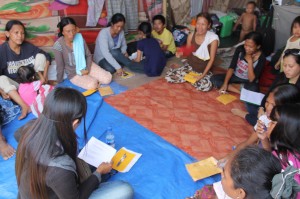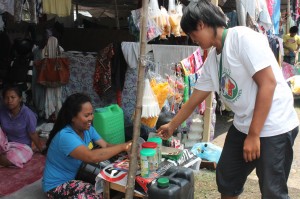
Acknowledging the special needs of evacuees in the recent Zamboanga City armed conflict, the Department of Social Welfare and Development (DSWD) began conducting Family Development Sessions (FDS) inside the evacuation centers.
The FDS, a learning mechanism, is normally done as part of the conditionalities of the Pantawid Pamilyang Pilipino Program. Under the regular FDS, families are taught values formation, responsible parenthood, and other similar topics. Through the FDS, Pantawid Pamilya households become socially aware and involved in community development activities.
As a result of the armed conflict, the DSWD observed the need to conduct special FDS sessions for evacuees. Through the FDS, small group composed of seven (7) to 15 heads of the family come together and share their experience and plans for their future. The special FDS was specifically designed for affected families. The two-hour session is divided into three components. The first component is the sharing of experiences about the incident and how they managed to escape the danger zone. The second is the moving forward stage, which allows them to draw up plans for immediate future and at the same time help them cope with their traumatic experience. Lastly, the healing stage or the building back better phase that encourages them to heal the wounds caused by the incident.
Nurbiya Hamam an evacuee from Barangay Rio Hondo said that that they should remain positive with this kind of situation. Confident that DSWD is helping them return to normalcy, Nurbiya appealed for houses to be provided to the evacuees as they start a new chapter in their lives.
Cabir Salih, 52 years old, from Sta. Catalina said that the session helped ease his tension and finding out that other have similar experience have helped. He, however, expressed worry about their finances. Cabir works as a porter at the local wharf and earns a daily income of P200-250. He was not able to work since the armed conflict started.
On the other hand, 18-year old Sawadjaan Midzfar from Sta. Barbara revealed that she finds the session a good venue for women like her, to express their emotions. She added that the FDS allowed them the opportunity to cry out their frustrations.

Thirty year-old Anisa Sawadjaan from Ayer Village, Sta. Catalina looks at the FDS session as a chance to relay her plans and aspirations. She used to buy vegetables from the local market and sell these in Isabela City, but the temporary suspension of trips to Isabela City forced her to discontinue her business. She looks after her mother and siblings since her father died in April.
“Gusto ko po sana magkaroon ng capital para makapag-umpisa ako muli. Meron lang ako P2,000 nung umalis kami sa bahay noon Sept 9 at ginamit ko yun pang umpisa ng maliit na tindahan dito sa evacuation center. (I wish that I will be given capital so I could start my business anew. I had with me P2,000 when we left our home last September 9 and I used some of it to start this small business inside the evacuation center),” Anisa related.
The family development sessions are venues for stress debriefing because they allow the victims to ventilate what they feel. The session also served as an outlet to identify the needs and plans of the evacuees .
“The FDS sessions became an opportunity for the evacuees to share their thoughts and feelings on the incident. They were able to come up with plans on how they can to cope with their experiences,” Evangeline Poquita, a DSWD Camp Manager assigned at Zone B at JFE Sports Complex, said.
Poquita said that through the FDS, the evacuees are made to realize that although the government is there to help, they need to help themselves too.
Essa Jumlain, a DSWD worker, realized how lucky he was after listening to the sharing of his group members.
“I can’t help but empathize with them on the difficulties that they have gone through. On the other hand, I am happy that in my own little way, I was able to relieve them of their tensions,” Jumlain said. He recounted that in the course of the session, there were also light moments where one or two would share an amusing experience during the conflict and at the evacuation center. This would trigger smiles that grew into chuckle and soon the participants would be laughing as they are able to relate to the others experiences.
DSWD Assistant Secretary Camilo Gudmalin, who oversees the progress of the FDS, said that the results will form part of the Department’s efforts to prepare evacuees for the early rehabilitation stage. “The needs and aspirations of the evacuees families have to be considered in coming up with an appropriate and relevant intervention suited to their needs,” Asec. Gudmalin emphasized.
He added that a rehabilitation plan have been laid out to help them in rebuilding their lives. “The rehabilitation of Zamboanga City will take quite sometime but we will be there along the way,” he assured. ###


